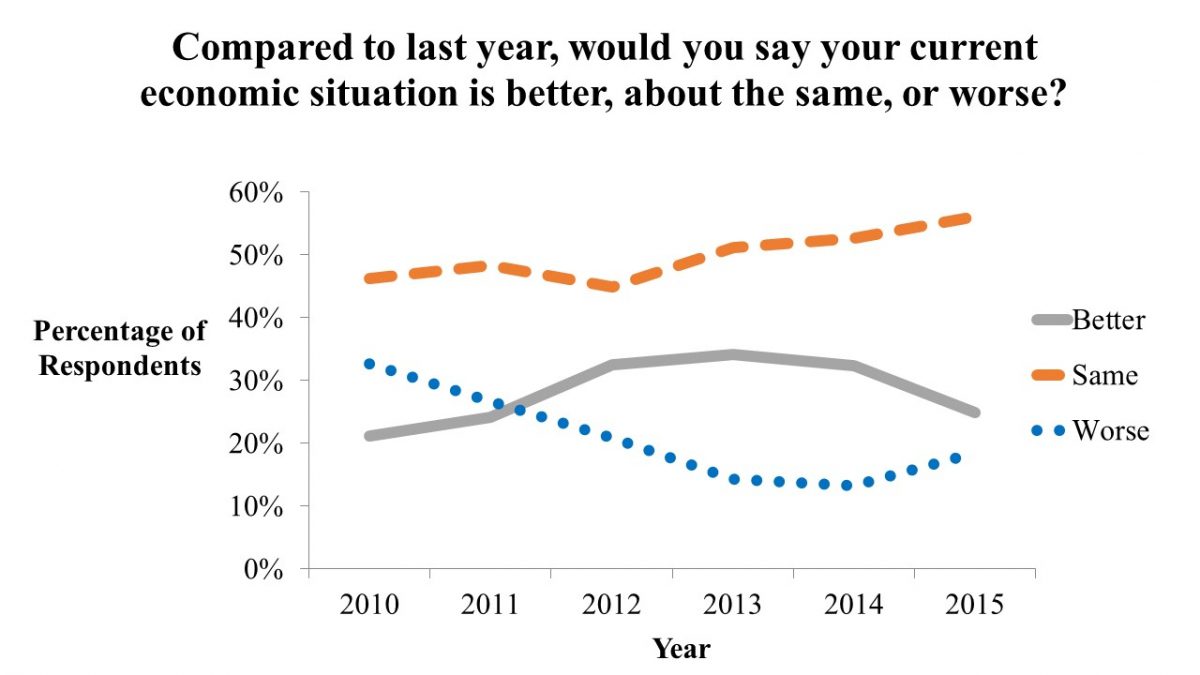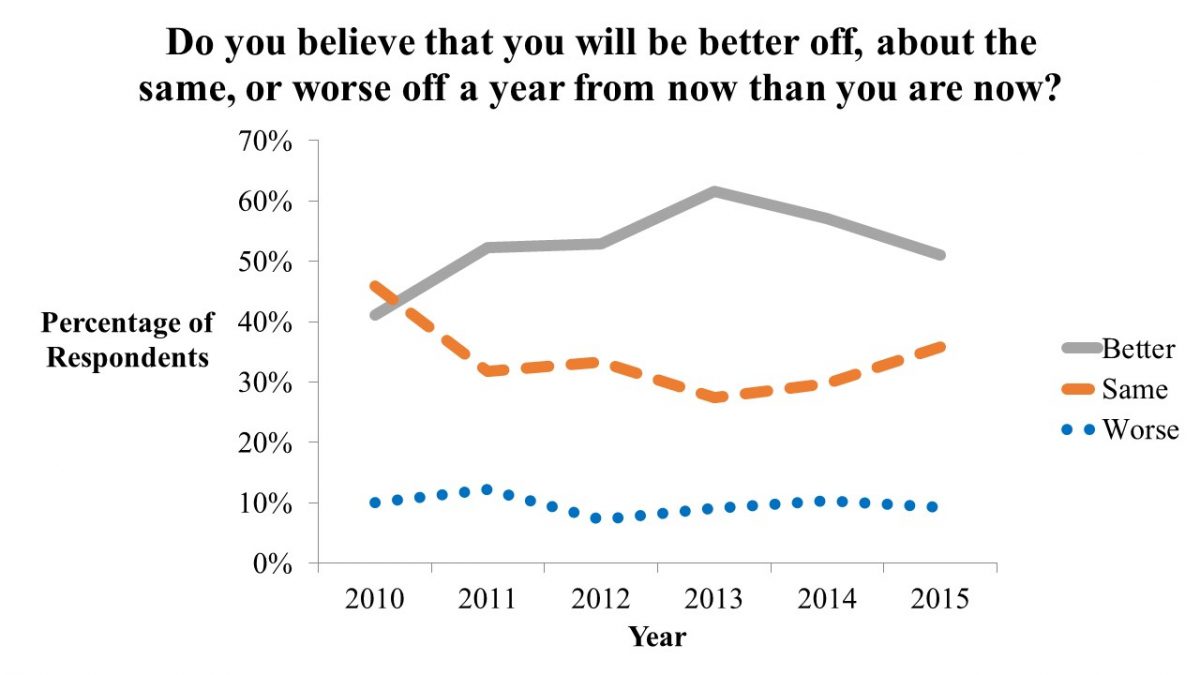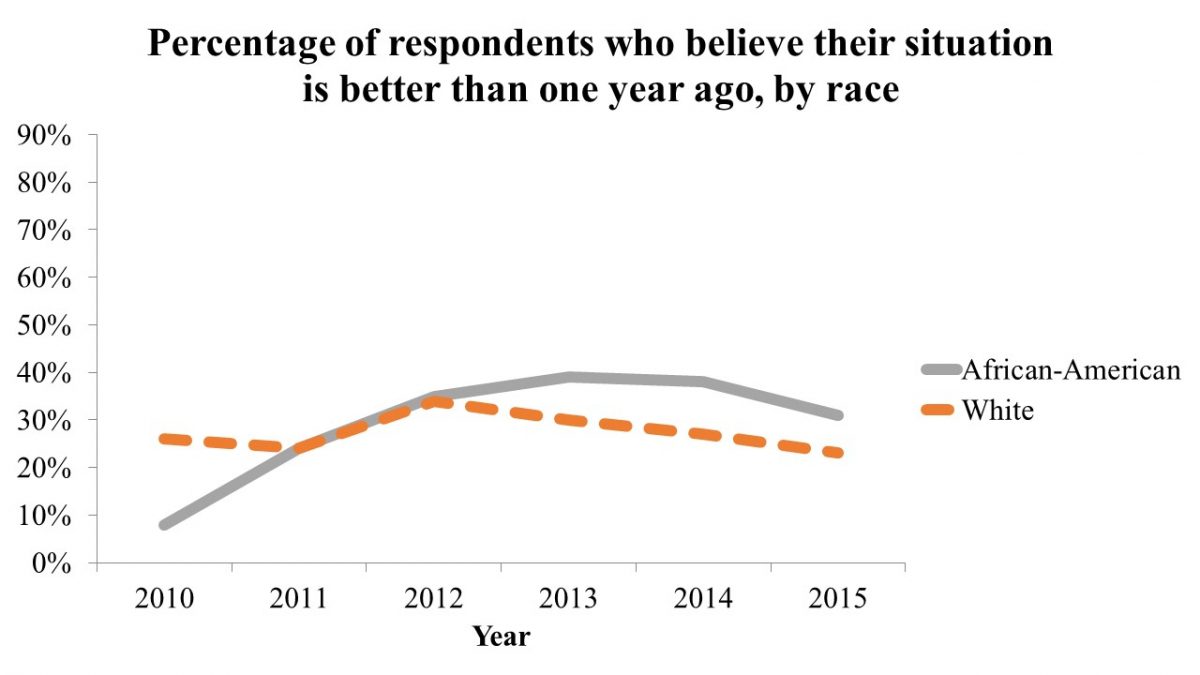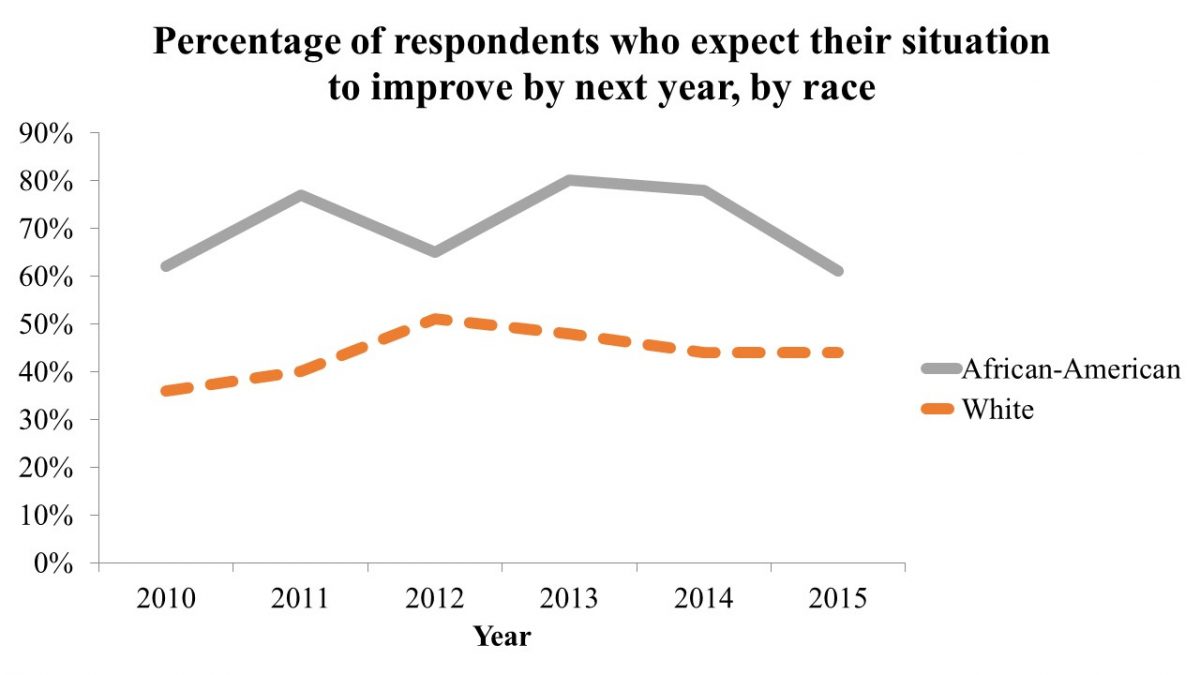Will last year’s stagnant economic hopes change?

Charlotte-Mecklenburg residents may be growing weary of the stagnated state of the economy, the UNC Charlotte Urban Institute’s Annual Survey showed.
For more than 30 years the institute has produced an annual survey of Mecklenburg County, primarily with questions from clients such as nonprofit agencies and local governments. But each year the institute includes a few additional questions to gauge local opinions on various topics.
|
Next annual survey If your agency would like to be part of the next annual survey – planned for early 2017 – contact Diane Gavarkavich, the institute’s director of research services, at D.Gavarkavich@charlotte.edu by Nov. 1. Learn more: /programs/annual-survey |
Over the past six years, the Institute has consistently asked Mecklenburg County residents these two questions:
- Compared to last year, would you say your current economic situation is better, about the same, or worse?
- Thinking ahead about your economic situation, do you believe that you will be better off, about the same, or worse off a year from now than you are now?
Reviewing the long-term trends in responses offers some insight into the level of frustration with the economy.
The most recent survey of 400 Mecklenburg residents took place in January 2016. Although it found nowhere near as many people saying they are worse off compared to the year before as the survey found for 2010, the survey did show an overall decline since 2012 in the percentage of people saying they are doing better than the year before.
Instead, the number of people reporting they are “about the same” has steadily increased, from 45 percent in 2012 to 56 percent in 2015. Essentially, people aren’t doing worse, but they also no longer feel they’re doing better. That might be satisfactory for people if the economy had been doing well for the past decade, but in a post-recession atmosphere, simply holding steady may not be enough for those respondents who have been struggling for years to keep their heads above water.

A similar trend can be seen in the second question, which asked how people expect the next year to be. In 2013, when the highest numbers for this question were reported, more than 60 percent of respondents thought they would do better over the course of the next year. By 2015 that number fell to 51 percent, with a simultaneous rise in those who said they expected to stay the same.

When breaking down these responses by demographic subcategories, some predictable trends emerge: Youth are more likely to think they will be better off one year from now than older residents, as do full-time workers compared to part-time or unemployed residents.
However, two demographic sub-trends are worth noting. First, although African-American and white residents consistently report having done better, the same, or worse in the past year at nearly equal rates, African-Americans tend to say they expect they will do better during the next year at much higher rates than whites. That trend of optimism reached its pinnacle in 2013, when 80 percent of African-Americans surveyed said they thought their situation would improve in the next year, compared to just 48 percent of whites. One possible factor behind this: In 2012 President Barack Obama, the nation’s first black president, was re-elected.
But despite consistently higher expectations, when the following year arrived, African-American and white residents generally had similar rates of reporting that they had in fact done better. It is also worth noting that by 2015 the percentage of white respondents saying their situation had improved in the past 12 months was as low as it was in 2010 and 2011.


The second seemingly anomalous breakdown is by income. Although those with lower incomes consistently report having done worse over the past year compared to those with middle and higher incomes, they also consistently report expectations for the next year that are almost identical to people with higher incomes. As with African-Americans, those with lower incomes seem to consistently over-estimate how they will do in the next year.


The survey can’t say what causes these differences in expectations, but other reports have uncovered similar findings. A September 2015 article in The Atlantic found that minorities tend to be more optimistic and believe more that the American Dream is still alive and well than their white counterparts. A May 2016 report by the Brookings Institution demonstrated that, specifically among the poor, black and Hispanic individuals are more optimistic and less likely to experience stress than white individuals. Although these reports cannot provide concrete explanations for their findings either, they speculate that these results may be due to stronger resilience and sense of community among minorities and the gradual narrowing of achievement and health gaps. Moreover, there may be some reason to believe in what Carol Graham of Brookings calls an “Obama effect,” that is, that the simple fact that the first African-American president is in the White House may be enough to make black and Hispanic individuals more optimistic about the direction of the country.
Although the institute’s annual survey can’t determine such things, the trends in the data are notable and consistent with results found elsewhere. Although there is no shortage of hope, especially among Charlotte’s minority and low-income populations, fewer and fewer people are feeling better about their financial situation, both in terms of where they are now and where they think they’ll be in one year.
And year after year, those who are poorer and those who are minorities seem, in comparison to their counterparts, to have higher expectations for their future than realities should warrant. It appears as though the actual economic situation may not be as important as people’s perceptions of the situation.
With recent data suggesting the economy’s recovery may be picking up and an extremely divided election looming, it will be interesting to monitor how people’s perceptions change moving forward, and to see what this will mean for these trends.
Thomas Swiderski is a social research specialist at the UNC Charlotte Urban Institute. Reach him at tswiders@charlotte.edu.